Investor collaborations can unlock billions to finance the SDGs
Organised by FAIR and the GSG, ‘’Joining forces: growing impact in Africa & beyond’’, a side event to the 3rd international Finance in Common summit, was dedicated to impact finance.
It brought together experts and international leaders to discuss concrete solutions to finance Sustainable Development Goals (SDGs).
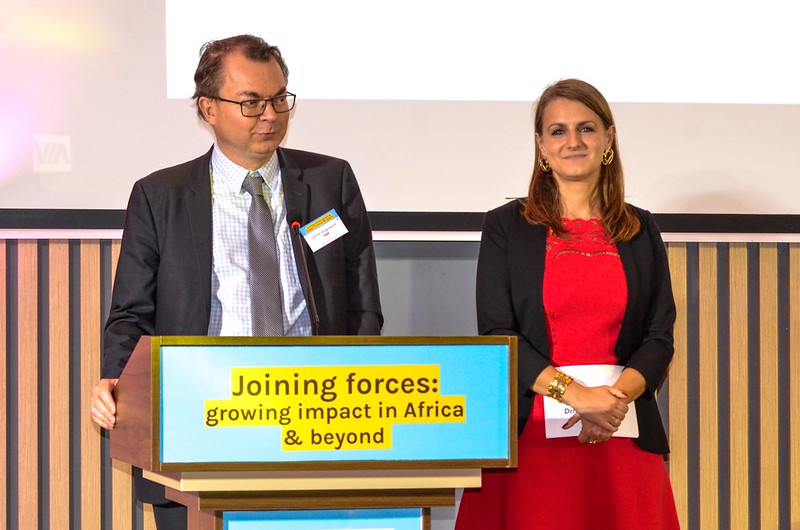
Global leaders agreed that there is an urgency to step up and collaborate more to achieve the SDGs.
-
- DFIs and public development banks (PDBs) are uniquely positioned to attract other investors, such as pension funds, to invest for the SDGs.
- $35bn USD could be unlocked if 10% of pension fund capital in Africa was invested towards the SDGs. A new report1 was published at the event to explain how.
- New collaborations have been announced to increase capital flows to the SDGs in Burkina Faso, Ivory Coast, and Senegal.
Participants and speakers alike agreed that the SDGs can only be achieved if we increase collaborations between all stakeholders, and public finance and private finance players in particular. Currently there is an estimated annual $4.2Tr USD financing gap for the SDGs, and public finance alone will not be sufficient to close this.
Across the day, speakers from government, development finance institutions (DFIs), private investors and other private sector players shared concrete solutions that demonstrated how public and private players can achieve much more by working collaboratively, in areas as diverse as climate mitigation, healthcare, financial inclusion, or agriculture.
Belmonde Dogo, Minister of Solidarity and the Fight against Poverty, Ivory Coast, highlighted in the opening keynote that “to achieve the SDGs, we need the constant support of both public and private sector players. To mobilise capital for a sustainable and inclusive growth in Africa, we will need synergies and coordination between all stakeholders, alongside the creation of a new institutional framework.”
Cliff Prior, CEO, GSG, reinforced the core role of public finance to attract significant amounts of private investments: “DFIs and public development banks (PDBs) are uniquely positioned to demonstrate and develop the investability of SDG projects for other investors. They need to make better use of the de-risking instruments that they already have at their disposal.”
DFIs and public development banks (PDBs) are usually government majority-owned or benefit from government guarantees. This enables them to provide financing on competitive terms or to deploy de-risking instruments, abilities that they should use more to attract further private investments.
The deployment of such de-risking mechanisms can help other investors see opportunities where they wouldn’t have invested previously. For example, if even 10% of pension fund capital in Africa was invested towards the SDGs, that could unlock $35bn USD for the SDGs on the continent. A new report ‘Unlocking pension fund capital for small business finance2’ launched at the event by Collaborative for Frontier Finance, in collaboration with GSG, explores ways in which pension fund capital can be unlocked and play a bigger role in SME finance, the beating heart of economies in terms of jobs, GDP and overall resilience.
Paul-Harry Aithnard, Managing Director, Ecobank Côte d’Ivoire explains: “A major challenge to develop SMEs and make them grow over the long term is to support them at two levels: digitalization and capacity building. Partnerships with other actors are essential to deliver quality services in both areas.”
Dr. James Mwangi, CEO, Equity Group Holdings concludes: “Finance needs to become demand driven rather than supply driven as it has been for so long. Equity Bank has grown thanks to a strong partnership with communities. It has been a symbiotic relationship. I want now to extend an invitation to collaborate and support 5 million SMEs on the continent.”
Thanks to experts from Burkina Faso, France, Ghana, Ivory Coast, Japan, Nigeria, Senegal, South Africa, UK, Zambia, and the EU sharing their work and calls to action, commitments were made, and new collaborations are now underway. Burkina Faso, Ivory Coast, and Senegal, amongst others, have committed to establishing a National Advisory Board (NAB) to develop their national impact finance ecosystems, as a foundational step to ensure that more capital flows to the SDGs.
The Global Steering Group for Impact Investment (GSG) Announces Partnership with Finance in Common
Ahead of the annual Finance in Common Summit (FICS) in Abidjan, Côte d’Ivoire, the Global Steering Group for Impact Investment (GSG) is pleased to join the Finance in Common network as a formal partner. By becoming part of this global community of public development banks the GSG will help create a critical bridge between public finance institutions and private sector actors to ensure that more capital can flow towards the achievement of the UN Sustainable Development Goals (SDGs).
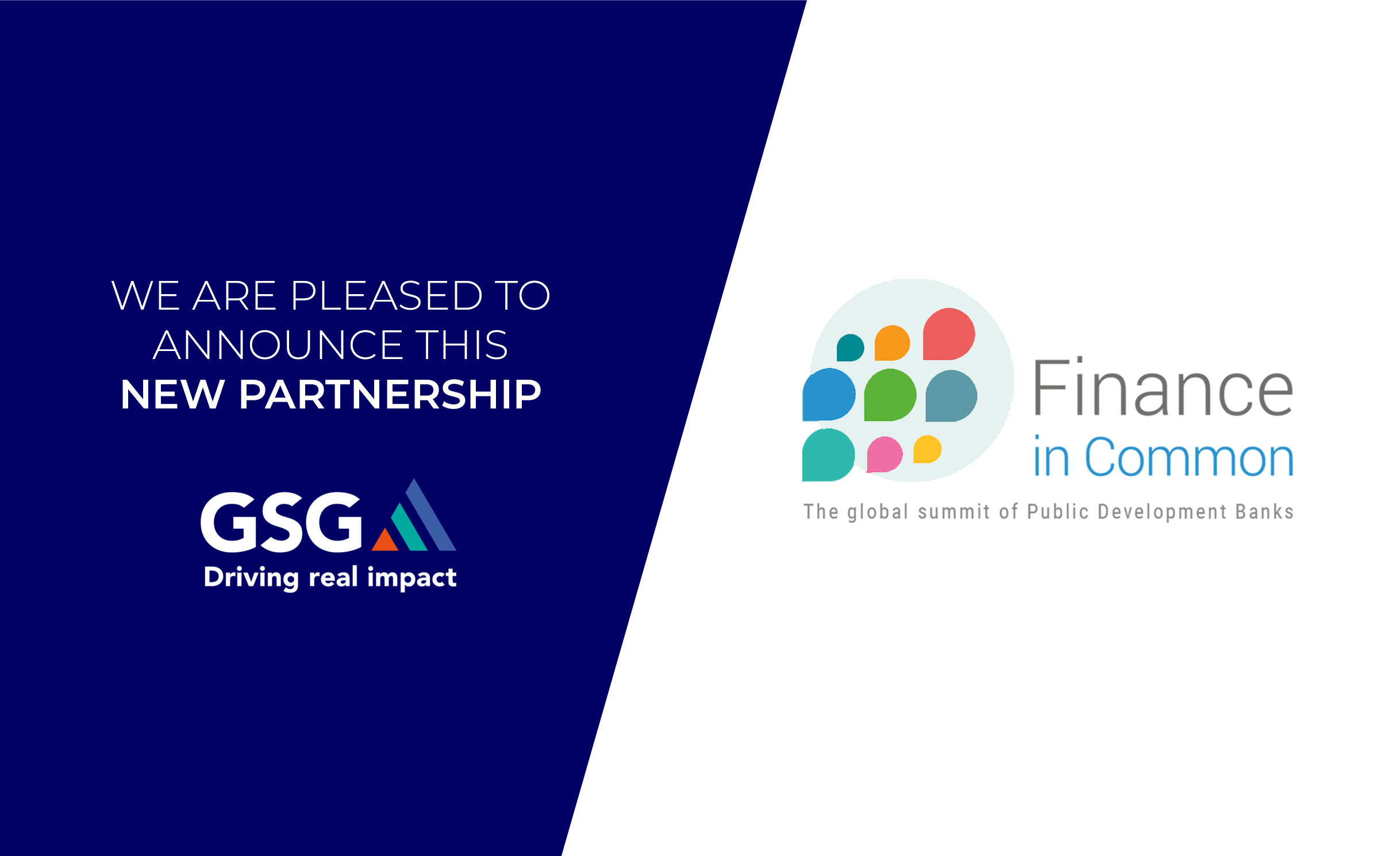
The impact investment movement is making impressive progress, with the most recent estimate of the current market size at US$2.3trn1. At the same time, there is a significant funding gap – US$3.7trn2 – between annual financing needed to meet the SDGs by 2030 and what is provided by current investment. There is sufficient capital and desire from investors to fill this gap, particularly when it comes to investment in African markets.
Boasting the world’s youngest population and the largest free trade area in the world under the African Continental Free Trade Area (AfCFTA) agreement, the continent is primed to undergo rapid and extensive development. It is understandable why over half3 of respondents to the latest Global Impact Investor Network survey said they intend to increase their allocation in these emerging economies. But when it comes to mobilising funds and applying them effectively to benefit those in need, cross-sector cooperation through well-designed interventions is key.
By partnering with Finance in Common – the global network of all public development banks (PDBs) which aims to align financial flows to the 2030 Agenda and Paris Agreement for Climate Change – the GSG is helping to strengthen partnerships between public finance institutions and private sector actors and accelerate capital flows towards the achievement of SDGs.
Evidence suggests that well-designed partnerships between public and private institutions can play a vital role in achieving inclusive outcomes that benefit people and our planet. This is especially true when it comes to emerging economies, which present significant opportunities for SDG investment, but often lag behind when it comes to the infusion of capital. By working together, GSG and FIC’s common goal is to mobilise key stakeholders to attract investments, and channel that capital where it is needed most to drive real, lasting impact.
Upon joining Finance in Common as an official partner, through the power of collaboration GSG seeks to support concrete initiatives on the ground to achieve the integration of social and environmental objectives in emerging markets, and building on its existing relationships in Zambia, Ghana, Nigeria and South Africa, which are already improving SME finance and growing businesses working towards positive impact.
“I am extremely happy for this new partnership between Finance in Common and GSG for Impact Investment. One of the objectives we set ourselves is to catalyse finance for the SDGs through leveraging other players in the financial market. This is why our collaboration with GSG is essential. Through this enhanced cooperation, we can contribute to the mobilization of broader finance, both public and private, towards development impact.” Remy Rioux, President of Finance in Common, Chief Executive Officer, Agence Française de Développement (AFD).
The annual Finance in Common Summit (FICS), taking place in Abidjan, Côte d’Ivoire from 18–20 October 2022 will emphasise the critical importance of collaboration in driving positive change in emerging markets. Organised by the European Investment Bank (EIB) and the African Development Bank (AfDB) alongside the Agence Française de Développement (AFD), this year’s Summit will explore a ‘Green and Just transition for a sustainable recovery.’
The GSG and FAIR (GSG’s French National Advisory Board) are organising an in-person FICS side event: Joining forces: growing impact in Africa & beyond, taking place on 18 October. The event, offering a full day of workshops and sessions, will explore how the public and private sectors can leverage each other to mobilise private capital for public good, drive inclusive growth, create resilience and contribute to the achievement of the SDGs.
Joining forces: growing impact in Africa & beyond will engage industry-leading speakers, notably from francophone African countries with developing ecosystems. Speakers will include Belmonde Dogo, Minister of Solidarity and the Fight against Poverty, Government of Côte d’Ivoire; Rémy Rioux, Chief Executive Officer, Agence Française de Développement (AFD); and Serge Ekue, President, West African Development Bank (BOAD), among others. Attendees will include PDBs, development finance institutions (DFIs), multilateral development banks (MDBs) and donors, alongside other key stakeholders including governments, central banks and private sector actors.
Learn more here and register to attend here.
The event is free to attend and will take place in both French and English (with simultaneous translation).
ENDS//
Notes to editors
For media enquiries, please contact: Kristen Ahmad-Gawel (Atalanta) media@gsgii.org
About the Global Steering Group for Impact Investment (GSG)
The Global Steering Group for Impact Investment (GSG) is an independent group promoting sustainable development and advancing education in impact investment. The GSG was established in 2015 as the successor to, and incorporating the work of, the Social Impact Investment Taskforce established under the UK’s presidency of the G8. The GSG’s National Advisory Boards (NABs) currently cover 35 countries. The GSG brings together leaders from finance, business, philanthropy and governments to drive a shift towards impact economies. Follow the GSG on Twitter and LinkedIn.
About Finance in Common
Finance in Common is the global network of all Public Development Banks (PDBs), which aims to align financial flows on the 2030 Agenda and Paris Agreement for Climate Change. Its objective is to strengthen partnerships among PDBs to accelerate the convergence towards shared standards and best practices, to support banks’ commitments to shift their strategies towards sustainability, and to give PDBs more visibility in the global fora discussing international policy issues. By mobilizing PDBs and crucial stakeholders, from private sector to civil society organizations, its aim is to encourage more coherent approaches to make the whole development finance system consistent with our common climate and sustainability objectives.
1 Source: International Finance Corporation
2 Source: Organisation for Economic Cooperation and Development
3 Source: Global Impact Investor Network
Members of the ISSB-SCC hold their first meeting, joined by the GSG as an expert advisor.
GSG Chief Policy Officer – Sebastian Welisiejko – joins the global efforts to progress impact transparency at the first meeting of the International Sustainability Standard Board’s (ISSB) Sustainability Consultative Committee (SCC).
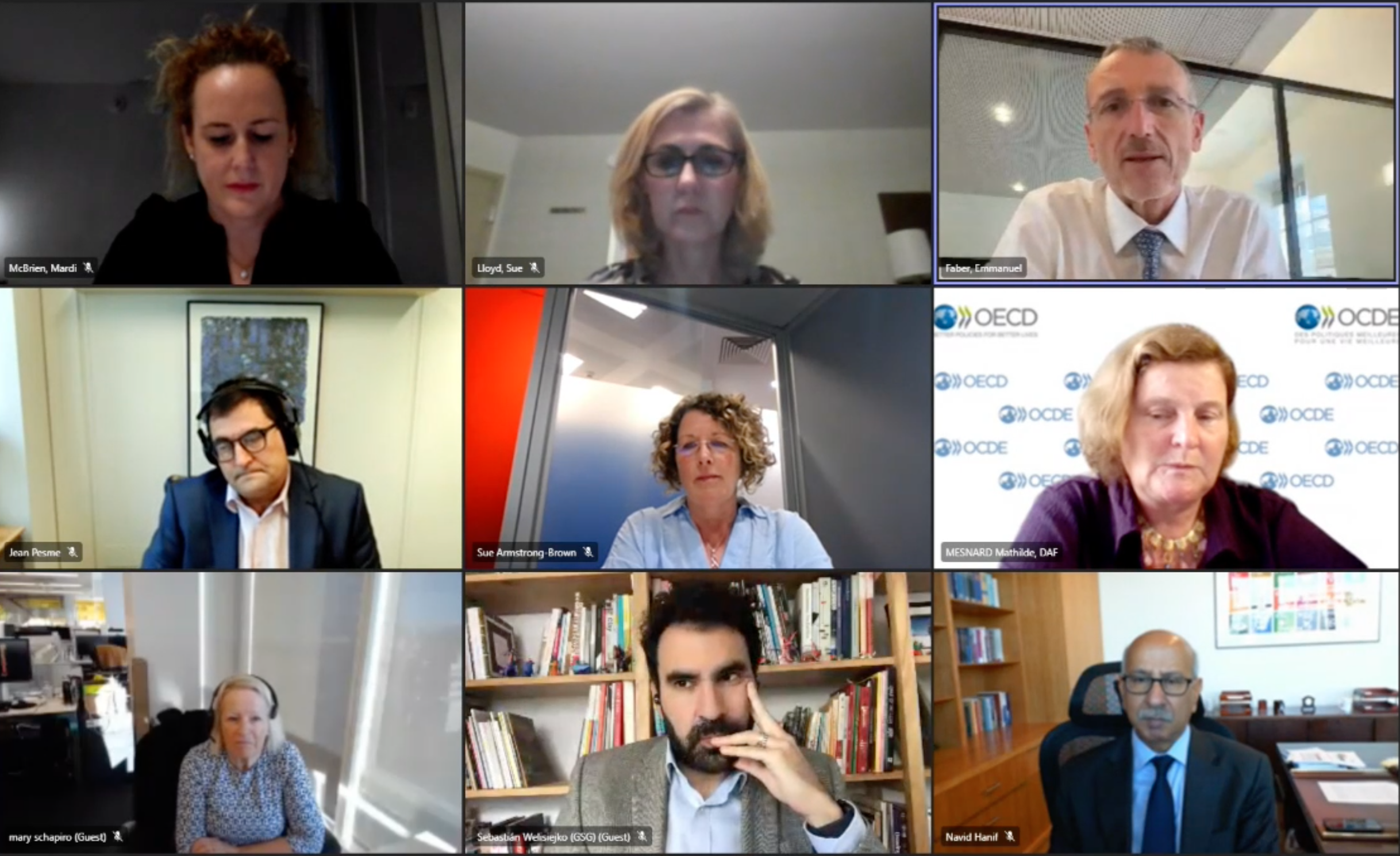
The IFRS Foundation’s International Sustainability Standards Board (ISSB), chaired by the GSG-led Impact Taskforce (ITF) Steering Committee members, Emmanuel Faber and Jingdong Hua, has formed a Sustainability Consultative Committee (SCC) to “inform and advise the ISSB on priority sustainability matters and related technical protocols, as well as significant interdependencies between sustainability matters”. Acting as a consultative and advisory forum, SCC members will “constructively contribute towards the achievement of the ISSB’s goal of developing globally accepted, high-quality sustainability disclosure standards”.
The GSG is proud to have been appointed as a member of the ISSB’s SCC, represented by its Chief Policy Officer, Sebastián Welisiejko.
Four permanent members of the SCC; the International Monetary Fund (IMF), the Organisation for Economic Co-operation and Development (OECD – OCDE), the United Nations (UN) and the World Bank will be joined by seven expert advisors, including the GSG.
Chief Policy Officer and head of the G7 ITF Secretariat, Sebastián Welisiejko said of the ISSB-SCC appointment:
The GSG is delighted to join the ISSB’s Sustainability Consultative Committee, alongside outstanding colleagues and impact leaders from all over the world. Together with my team, we will seek to both contribute to and learn from the crucial work of the ISSB, in close connection with members of the GSG across 35+ countries.
We look forward to continuing our efforts to implement the recommendations of the G7 Impact Taskforce, which stressed the importance for the global reporting baseline to be relevant to both developed and emerging economies, to reflect perspectives and realities of SMEs as well as large corporations, and for it to strike an adequate balance between “green” and “social” elements, recognizing the inextricable connection amongst the two in our journey towards a just transition to net zero economies
Background and key developments in impact transparency
- Global investment portfolios are increasingly demanding transparent, reliable and comparable company disclosures on environmental, social and governance (ESG) related matters.
- Taking investment decisions through a triple lens of risk, return and impact, impact investment moves beyond current ESG frameworks and seeks to develop more reliable, robust and comparable standards for better informed investment decision making.
- A major hurdle to increased impact transparency is a lack of a global baseline to understand and measure companies’ impact(s). Significant developments have been made towards the creation of globally accepted, high-quality sustainability disclosure standards – the most notable being the establishment of the IFRS´s ISSB in November 2021 and its ongoing work to deliver such a baseline.
- Created under the 2021 UK G7 presidency, the Impact Taskforce (ITF) gathered inputs from more than 170 finance, policy and business leaders representing more than 110 organizations in 40 countries to harness investment for the good of all people and the planet.
- Led by the GSG and UK network partner the Impact Investing Institute, the ITF identified impact transparency as a key lever for change towards sustainable and impact economies.
- Welcomed by G20 and G7 leaders at COP26 in November 2021, the IFRS Foundation announced the creation of a new standard-setting board – the International Sustainability Standards Board (ISSB) – to work towards “a comprehensive global baseline of sustainability-related disclosures standards that provide investors and other capital market participants with information about companies’ sustainability-related risks and opportunities to help them make informed decisions”.

Upgrading living conditions for 1 billion people in the Global South critical to meeting the SDGs
LONDON – Impact-led Investment of $6 trillion is needed to lift over 1 billion people out of slum conditions across the Global South. Doing so will represent an essential step towards the world achieving the SDGs by 2030, according to the GSG’s latest report entitled “Informal Settlements: No Longer Invisible”.
Despite the urgent need for investment, public funds alone are woefully insufficient to address the requirements for upgrading slums. Furthermore, informal settlement investments have been largely overlooked by investors, who have been focused on other pressing themes such as education, access to healthcare or agriculture.
The GSG’s Informal Settlements report makes the case for prioritising urban slums as a core area for impact investment and development. It outlines how improving the places in which people live can have multiple benefits for public health, education and economic opportunities, making addressing informal settlements central to achieving the SDGs. The report also identifies private capital structures, as well as the cooperation between investors, government bodies and other stakeholder groups, needed to draw in impact investment.
Around the world, one in eight people live in informal urban settlements without proper access to drinking water, sanitation or electricity. The issue is widespread and acute with 55% of the urban population of Zambia living in slum areas, along with some 48% of the urban population in Bangladesh, and 28% in Colombia.
In addition to poor housing without basic utilities, the precarious and often illegal nature of slum developments means that many inhabitants cannot access education, healthcare, the labour market or financial services. Death rates among infants and children are higher than for other urban groups, there is greater risk of respiratory infection, and inhabitants are more affected by the effects of climate change, such as flooding in low-lying areas.
“The impacts of slum-upgrading programmes and projects reach far beyond providing much needed basic infrastructure; they improve living conditions, public health and educational outcomes, and stimulate local economies by boosting quality job creation,” said Sir Ronald Cohen, the GSG’s Chair.
“By shining a light on informal settlements, our aim is to spur the creation of financial vehicles and solutions that both help to address many of the complex issues slum-dwellers face, while offering purpose-driven investors the opportunity to deliver impact at scale and meet their financial return objectives,” Cohen added.
The GSG highlights the potential to adapt existing financing instruments, including Green, Social, Sustainability and Sustainable-Linked Bonds to channel private capital investment into informal settlements. Over $1 trillion was raised across such instruments in 2021, which Moody’s ESG Solutions forecasts will increase to $1.35 trillion in 2022.
The report also draws attention to the often-sizeable informal economies in slums. A 2020 study by the Data Favela Institute and Locomotiva Institute found that residents of Brazilian favelas had a combined purchasing power of almost $28 billion, more than the annual GDP of Cambodia or El Salvador. If this economic strength is recognised – and potentially guaranteed by governments – it could be mobilised to help pay returns, creating a win-win-win for communities, investors and society at large.
The GSG makes a number of recommendations for investors, governments and other stakeholders to prioritise and drive investment into informal settlement upgrades. These include:
- For investors to look beyond thematic approaches in areas like healthcare and education at place-based solutions and multi-dimensional strategies
- For governments to make tackling informal settlements a priority and find solutions to de-risk investments for investors
- For urban planners and habitat experts to acknowledge and understand the role that private investment can have in upgrading urban areas
- All stakeholders to recognise the need to place communities at the heart of projects, involving resident and giving them a sense of ownership.
In short, the report calls on all parties to no longer view slums and their inhabitants as a problem, but to acknowledge the potential in transforming urban liabilities into assets. The GSG aims to stimulate an action-oriented conversation that will lead to the creation of scalable solutions that will address a global challenge affecting over a billion people, and ultimately help deliver the SDGs.
Please click here to download the Informal Settlements: No Longer Visible report.
ENDS//
Notes to editors
For media enquiries, please contact:
Lynn Nicholson, Chief Communications Officer, The Global Steering Group for Impact Investment – lynn.nicholson@gsgii.org
Mobile: +32 494 813 837
About the Global Steering Group for Impact Investment (GSG)
The Global Steering Group for Impact Investment (GSG) is an independent global steering group promoting sustainable development and advancing education in impact investment. The GSG was established in 2015 as the successor to, and incorporating the work of, the Social Impact Investment Taskforce established under the UK’s presidency of the G8. The GSG’s National Advisory Boards (NABs) currently cover 35 countries. The GSG brings together leaders from finance, business, philanthropy and governments to drive a shift towards impact economies. For more information visit www.gsgii.org and follow the GSG on and follow the GSG on and follow the GSG on Twitter and LinkedIn.
The Impact Taskforce (ITF)
Established under the 2021 UK Presidency of the G7
Open letter from the ITF Chair
Progress update – June 2022
Background
In June 2021, 120 leaders from the worlds of investment, finance, government and international organisations, came together as an industry-led Taskforce under the auspices of the UK Presidency of the G7 to help answer a critical question for our time: “How can we accelerate the volume and effectiveness of private capital seeking to have a positive social and environmental impact?”
In just over four months, the Impact Taskforce (ITF) launched a series of ambitious, yet concrete and actionable recommendations to i) help transform the quality and transparency of information on the impact of investment decisions, and ii) scale mobilisation of institutional capital for positive impact, especially in emerging markets through vehicles that integrate social and environmental objectives in support of the United Nations’ Sustainable Development Goals (SDGs) and a just transition that does not leave people and places behind.
At all times we were conscious that success was not the publication of a series of reports, but to engage top decision-makers around our specific recommendations, obtaining a sustained commitment to the mobilisation of private capital for public good and seeing intermediate milestones achieved.
Six months after our launch, we are particularly encouraged by developments that directly take forward key recommendations made by the Taskforce. On the impact transparency front, this includes initial drafts and proposals by the IFRS´s International Sustainability Standards Board (ISSB), the US Securities and Exchange Commission (SEC) and the EU´s European Financial Reporting Advisory Group (EFRAG) to advance climate and sustainability reporting standards. On impact capital mobilisation, we welcome the launch of the Just Transition Finance Challenge, a new coalition of investors heeding our call to launch more financing vehicles that deliver a global, fair and inclusive transition to Net Zero.
Whilst we commend stakeholders, including ITF members and third parties, for making real progress on a number of additional fronts, we also call for faster movement in areas where action is lagging behind.
Progress on the ITF Recommendations
In the field of impact transparency (our Workstream A), back in December 2021 we called on a wide range of stakeholders, from regulators and standard setters to investors and companies to work towards a future in which investment decisions, by companies and institutional investors are increasingly taken through the triple lens of risk, return and impact. In particular, we i) called on governments to support and participate in upcoming consultations by the IFRS´ International Sustainability Standards Board, ii) called for an urgent “build” on the ISSB´s reporting “baseline” to include any impacts on all stakeholders, iii) defined mandatory accounting for impact as a destination, and iv) recommended that the G7 countries and partners collaborate with the private sector, standard-setters and academia on approaches to impact valuation.
In the light of these recommendations, over the past six months we were encouraged by:
- The appointment of ITF Steering Committee member Emmanuel Faber as Chair of the IFRS´ International Sustainability Standards Board (ISSB), mandated with the crucial mission of establishing a “comprehensive global baseline of sustainability-related disclosure standards that provide investors and other capital market participants with information about companies’ sustainability-related risks and opportunities to help them make informed decisions”. In just a few months, the ISSB published exposure drafts on Sustainability and Climate-related disclosures, opening a public consultation process ending on 29 July, 2022. We urge governments, industry bodies, standard-setters and other relevant stakeholders to support and engage closely with this process, taking into account the ITF recommendations to achieve standards that are truly globally relevant by, i) balancing social and environmental issues; ii) acknowledging and reflecting realities of both emerging and developed economies; iii) actively engaging small and medium enterprises (SMEs) along the value chain; and iv) putting forward an assurance regime for all data relevant to enterprise value for public companies.
- Proposals by the US Securities and Exchange Commission (SEC) to introduce changes that “would require registrants to include certain climate-related disclosures in their registration statements and periodic reports, including information about climate-related risks that are reasonably likely to have a material impact on their business, results of operations, or financial condition, and certain climate-related financial statement metrics in a note to their audited financial statements”
- The first reports (of a series of seven) by the European Financial Reporting Advisory Group (EFRAG), to advance corporate sustainability reporting across the EU. EFRAG recognises the importance of coordinating the development of EU sustainability reporting standards with existing and emerging global initiatives, which we deem imperative to advance towards a global baseline that is widely adaptable across the globe, in both developed and emerging markets.
- Continuing progress in the field of impact valuation, through the recent collaboration announcement by the Value Balancing Alliance (VBA) and the Impact-Weighted Accounts Project at Harvard Business School (HBS IWA) to harmonise methodologies on impact accounting, as well as emerging efforts by the Capitals Coalition to establish a global Value Commission to “set international rules for how ‘value factors’ are created and used by organisations around the world.”
Strong and sustained progress on the impact transparency and integrity agenda will continue to be crucial to address emerging concerns across a number of jurisdictions, including with respect to ESG disclosure and the current lack of clear, consistent and standardised reporting mechanisms. Current controversy and confusion amongst some market participants should be seen as both a sign of relevance of the impact transparency and integrity agenda, as well as a clear call to provide high quality data to all stakeholders, making our work and recommendations, as well as the goals of the ISSB and similar efforts, more important than ever.
In relation to the mobilisation of capital for positive impact at scale (our Workstream B), at the moment of its launch, the ITF i) urged coordinated movement spearheaded by the G7 to remove multiple external and internal barriers that currently limit the flow of institutional investors’ transformational capital particularly to emerging and frontier economies, ii) recognised the need for integration of environmental and social factors to drive an inclusive, fair, and equitable transition to net zero economies, iii) called on multilateral development banks (MDBs) and development finance institutions (DFIs) to support for the mobilisation of capital, by more actively using a range of proven tools and instruments and improving frameworks for sustainable investment that currently constrain deployment, and iv) urged an expansion of capabilities and increase in transparency to support the deployment of funds to people and places of greatest need and opportunity.
Since we launched in December 2021, global events have made the financing challenge even bigger and the relevance of our positive impact agenda even greater. Again, we see some positive progress against a background of increasing urgency. The widespread consequences of the Russian war on Ukraine, including disruptions to the world´s food and fuel markets and economic volatility including rising inflation, is dangerously increasing uncertainty and challenging social stability across developed, middle income and emerging markets – as, according to the UN, 1.7bn people will be exposed to disruptions leading to poverty and hunger, 500k people are currently in famine (a 500% increase from 2016) and over 250m are at hunger level (doubled since start of Covid).
This reinforces in our mind the importance of the impact agenda, and our specific recommendations to boost private investment in emerging economies by dismantling barriers and providing incentives.
Over the past six months:
- We were particularly encouraged that leading investors – asset owners, managers and development finance institutions alike – have answered our call to action to launch more financing vehicles explicitly dedicated to advancing a global, fair and inclusive transition to Net Zero. July will see the launch of the Just Transition Finance Challenge, an initiative convened by the Impact Investing Institute (III) in partnership with the City of London Corporation, and which leading global financial institutions have agreed to join as Founding Participants. The Challenge will mobilise investment in a transition to Net Zero, helping asset owners and managers to respond to the growing demand for sustainable finance products and the urgent need to address the climate crisis. In particular, the Challenge will launch a Just Transition label for financing vehicles that help to deliver a fair and inclusive transition to Net Zero. The Challenge will be officially launched on 18 July at the Lord Mayor’s Finance for Impact Summit in London. You can register to attend the launch virtually here.
- Around the launch of the ITF recommendations, over 160 firms with $70 trillion in assets have joined forces to steer the global economy towards net-zero emissions and deliver the Paris Agreement goals. The work of the Glasgow Financial Alliance for Net Zero (GFANZ), chaired by UN Special Envoy on Climate Action and Finance Mark Carney and bringing together leading net-zero initiatives from across the financial system, needs to be widely supported to accelerate the transition to net-zero emissions by 2050. The existence of coalitions such as GFANZ validate our argument that “there is more than enough private capital” to deliver on the SDGs. The challenge remains about how we can make it easier for that capital to flow where it can have the most positive impact on people and the planet.
For this transition to be just and inclusive, in line with the ITF call and proposals, a series of elements need to be an integral part of any financial vehicle aiming to drive capital to where it is needed the most, namely: i) climate and environmental action, ii) socio-economic distribution and equity and iii) community voice.
- Development partners and South African stakeholders have made progress to implement the $8.5bn funding pledge to support a just energy transition in South Africa, as announced in COP26. The pace and success of this effort is critical both for the benefit of South Africa but also given its replicability in other economies heavily reliant on carbon-heavy energy sources, such as Indonesia, facing both an environmental challenge but also severe social risks (e.g. nearly 80% of circa 150,000 South African miners are in one province of the country, where issues of reskilling, potentially relocation or rehabilitation of toxic land will be intense). The $8.5bn pledge is intended to catalyse other capital including blended and catalytic capital, for which ITF recommendations can be particularly relevant. Specifically, our argument about the need for public and private capital to work together in new modes of partnership, about to be tested in South Africa, will be crucial for demonstrating the practical implications of the Just Transition, as well as a potential model for other jurisdictions. ITF members have been engaged in the debate around optimising the impact of the $ 8.5 billion public commitment, and the need to not neglect the necessary social investment as a critical element in the Just Transition.
- The GSG (Global Steering Group for Impact Investment) has been working closely through its entities and partners across 35+ countries to advance impact-capital solutions to scale funding towards the rehabilitation of informal settlements across the global south, where over 1 billion people live without access to basic services or land titles. In a recent report the GSG estimates a global funding shortfall of $6Trn for slum upgrading globally, proposes specific solutions to scale investment and calls governmental, private sector and civil society stakeholders to work together to commit capital at scale to improve the lives of the urban poorest.
At the same time, the GSG is working with 15+ of its entities across the globe to advance advocacy and implementation of the ITF recommendations in different national contexts, including Japan, South Korea, Brazil, Mexico, The Netherlands, Spain, Germany, Argentina, Chile, Colombia, India, South Africa, Turkey and its entity covering Central American countries.
Whilst we engage in emerging conversations with Japanese authorities and wider stakeholders to advance our work under Japan’s presidency of the G7 in 2023, the ITF remains committed to advocating and, where appropriate through its organisation and partners, supporting and participating in high-impact initiatives to meet the key social and environmental challenges of our time.
More than ever, it is time to deliver.

The Rt. Hon. Nick Hurd
Chair, Impact Taskforce
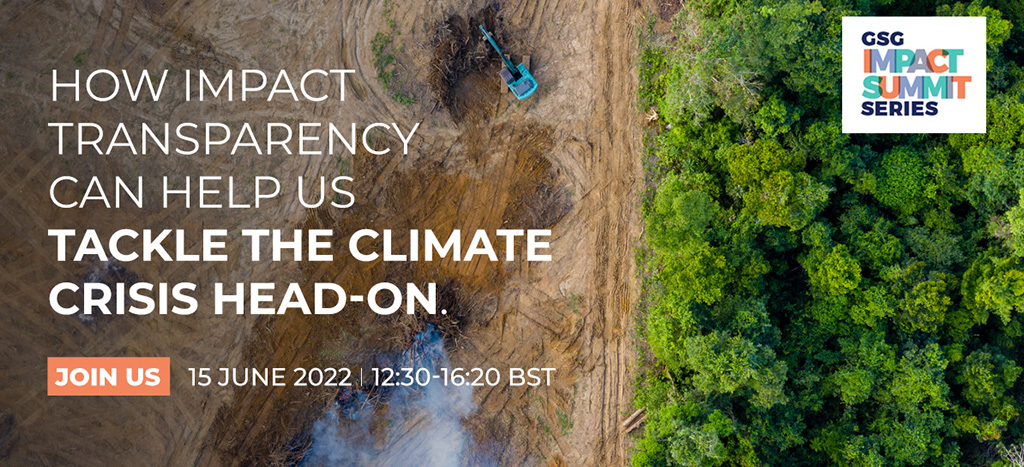
On Wednesday, June 15, the Global Steering Group for Impact Investment (GSG) will kick off its Impact Summit Series – an expansion of its annual Global Impact Summit – with Part 1: Financing a Better World Through Impact Transparency, taking place virtually from 12:30-16:20 BST.
As the world faces an ever more urgent climate crisis, global harmonised standards and regulatory reporting will pave the way for the public to have trust in the impact statements provided by investors and companies. And impact valuation will show where our impact efforts can be deployed best, for the benefit of all people and our planet. The three-part Impact Summit Series will convene impact leaders from around the world to discuss, debate, and share insights about the future of finance, and explore how impact transparency is crucial for our shared future.
Part 1: Financing a Better World Through Impact Transparency will focus on the role of regulators, ongoing developments on impact valuation and current efforts to implement this agenda globally, with contributions from impact leaders, practitioners and National Advisory Board (NAB) voices from around the world.
Speakers will include:
- Sir Ronald Cohen, Chairman, GSG
- Saori Dubourg, Member of the Board of Executive Directors of BASF
- Emmanuel Faber, Chair of the International Sustainability Standards Board
- Roger Ferguson, former Vice Chair of the U.S. Federal Reserve
- Gonzalo Gortázar, CEO of CaixaBank
- Jingdong Hua, former Vice President of the World Bank
- Nick Hurd, Chair of the G7 Impact Taskforce and former UK Government Minister
- Karen Karniol-Tambour, Co-Chief Investment Officer for Sustainability at Bridgewater
- Douglas L. Peterson, President and CEO of S&P Global
The full agenda for Part 1 can be viewed here. More information about the Impact Summit Series can be found here.
Accredited journalists can register to join Part 1 of the GSG Impact Summit Series here. Please select ticket PART 1: GENERAL PASS and use code MEDIA2022.
Dates and further information about the upcoming events in the Impact Summit Series are below.
22 September, 12:00-15:00 BST
Part 2: Boosting Capital Flows in Emerging Markets
In the second part of the Series, we explore the barriers to investment in the SDGs and provide concrete solutions, presented by asset owners, asset managers and other leaders already implementing them.
22 November, 12:00-15:00 GMT
Part 3: New Frontiers of the Impact Revolution, Townhall Meeting led by Sir Ronald Cohen
In the final part of the Series, Sir Ronald Cohen will lead a townhall meeting where we discuss boosting impact capital flows and debate how best to bring about full impact transparency for investors and businesses. We will look back at the progress made in implementing the G7 Impact Taskforce’s recommendations and the way forward in overcoming the challenges ahead.
ENDS//
Notes to editors
For media enquiries, please contact:
Lynn Nicholson, Chief Communications Officer, The Global Steering Group for Impact Investment – lynn.nicholson@gsgii.org
Mobile: +32 494 813 837
About the Global Steering Group for Impact Investment (GSG)
The Global Steering Group for Impact Investment (GSG) is an independent global steering group promoting sustainable development and advancing education in impact investment. The GSG was established in 2015 as the successor to, and incorporating the work of, the Social Impact Investment Taskforce established under the UK’s presidency of the G8. The GSG’s National Advisory Boards (NABs) currently cover 35 countries. The GSG brings together leaders from finance, business, philanthropy and governments to drive a shift towards impact economies. For more information visit www.gsgii.org and follow the GSG on Twitter and LinkedIn.

LONDON – The Global Steering Group for Impact Investment (GSG) is delighted to welcome Turkiye’s Impact Investing Advisory Board (EYDK) into the global National Advisory Board (NAB) family. The NAB is working on bring impact investing into the mainstream in Turkiye and integrating the country’s emerging impact ecosystem with the global impact community.
EYDK (www.eydk.org) brings together 38 leading public, private, and non-profit sector institutions across Turkiye. Its core aim is to advocate and map the national impact investing field. It is focused on building local, regional and international partnerships, while gathering and sharing impact information and raising awareness through initiatives including promotion and education.
GSG CEO Cliff Prior said: “We are delighted to welcome the Turkiye National Advisory Board into our growing impact community. This is a crucial time in the fight against climate change and global social challenges. EYDK will be a strong participant in the rapid development of a new investment future with impact transparency, and will help with the mobilisation of capital to places which need it most.“
EYDK President Safak Muderrisgil commented: “The readiness and motivation of the key stakeholders have accelerated Turkey’s involvement in the global impact economy in this historic turning point and EYDK is accordingly working towards nurturing the local ecosystem.”
The Turkiye NAB joins the GSG’s growing National and Regional Advisory Board network which covers 35 countries via 30 separate bodies. NABs support the GSG’s aim to catalyse impact investment and entrepreneurship to benefit people and the planet. Turkiye follows Nigerian NAB, which joined the community in December 2021.
A further 30 NABs are currently under development, many in lower and lower-middle-income countries around the world, underlining the growing reach of impact investing and the groundswell for investment made with positive environmental and social objectives at its heart.
ENDS//
Notes to editors
Contact for media enquiries
Lynn Nicholson, lynn.nicholson@gsgii.org, Tel.: +32 494 813 837
About the Global Steering Group for Impact Investment (GSG)
The Global Steering Group for Impact Investment (GSG) is an independent global steering group promoting sustainable development and advancing education in impact investment. The GSG was established in 2015 as the successor to, and incorporating the work of, the Social Impact Investment Taskforce established under the UK’s presidency of the G8. The GSG’s National Advisory Boards (NABs) currently cover 35 countries. The GSG brings together leaders from finance, business, philanthropy and governments to drive a shift towards impact economies. For more information visit www.gsgii.org and follow the GSG on Twitter and LinkedIn.
About Impact Investing
Impact investments are investments made with an explicit intention to generate positive, measurable social and environmental impact alongside a financial return. Impact investment optimises risk, return and impact to benefit people and the planet.

Brussels/London, 9th March 2022 –EVPA, the investing for impact community, the Global Steering Group for Impact Investment (GSG), as well as several of its National Advisory Boards and academic partners, have joined forces to provide a clear and reliable picture of the impact investment market in Europe.
The much-needed drive to mobilise capital for people and the planet is becoming increasingly mainstream. Sustainable and responsible investment is booming. Still, the notions of ‘impact’ and ‘sustainable’ investment are still blurry or intangible for a lot of people. This joint data collection will help create more transparency around impact investing practices and quantify their transformative impact on society and planet.
“Investing for impact has the power to transform society for the better. With more and better data, we’ll be able to shed more light on key trends and real impact. Data will also show us key gaps and challenges to address if we truly want to scale impact across Europe and achieve real and lasting social change”, said Roberta Bosurgi, EVPA CEO.
“There is a window of opportunity to reach sustainable development goals and net-zero, and impact investing is key to its achievement. Coordinating our efforts to map the size and shape of the impact investing market in Europe will help us understand how this crucial tool can best achieve a future fit for our people and planet”, said Cliff Prior, GSG CEO.
The European impact investment consortium gathers key impact players and builds on two years of discussions on how to harmonise methodologies and data collection strategies. The consortium initiates the first European Impact Investment Survey which aims to collect and aggregate data on impact investment practices, comprehensive of all players, country by country, throughout Europe in a consistent and comparable way.
In the medium term, the methodology aims at creating a blueprint for national market sizing processes that can be replicated in other regions thanks to the National Advisory Boards of the GSG and regional membership associations part of EVPA operating in other regions of the world.
The consortium will present overall findings in autumn 2022; detailed data breakdown and in-depth analysis will be available in time for EVPA Impact Week in Brussels (30 Nov. – 2 Dec. 2022).
For more information, contact:
Dragan Stojanovski, EVPA Head of Marketing and Communications
Email: dstojanovski@evpa.ngo
Notes to editors:
Impact investors wishing to take part in the survey can register here and submit their response.
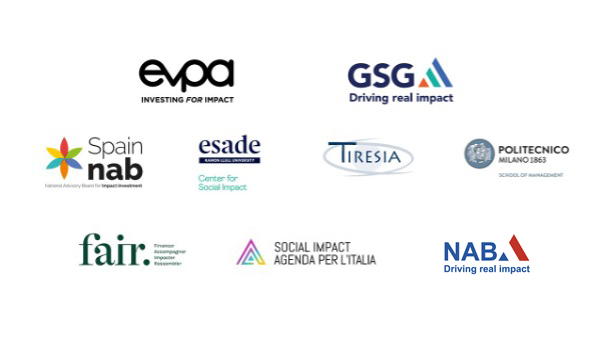
About EVPA
EVPA, the investing for impact community, is a unique network at the intersection of business and purpose, driven by knowledge and focused on impact. We rally people, capital, knowledge, and data to catalyse, innovate and scale impact. EVPA brings together a diverse group of capital providers (impact funds, corporations, foundations, private equity, banks, public funders) and social innovators of all sorts – from household names to emerging new players. Together we work to increase prosperity and social progress for all, fix inequalities and injustices and preserve the planet.
About GSG
The Global Steering Group for Impact Investment (GSG) is an independent global steering group promoting sustainable development and advancing education in impact investment. The GSG was established in 2015 as the successor to, and incorporating the work of, the Social Impact Investment Taskforce established under the UK’s presidency of the G8. The GSG’s National Advisory Boards (NABs) currently cover 33 countries. The GSG brings together leaders from finance, business, philanthropy and governments to drive a shift towards impact economies. For more information visit www.gsgii.org and follow the GSG on Twitter and LinkedIn.
About Social Impact Agenda per l’Italia
Social Impact Agenda per l’Italia is the GSG’s National Advisory Board for Italy and promotes the development of impact finance in Italy. The network gathers 24 organisations, representing investors, social enterprises, market builders, philanthropic institutions, which work together to establish a new economy that combines economic sustainability with positive social and environmental impact. SIA carries out advocacy, research, communication and market development activities, in order to create a favourable ecosystem for investments with positive impact.
About Politecnico di Milano – TIRESIA (Technology Innovation & REsearch for Social ImpAct)
TIRESIA is a research centre based in the School of Management of the Polytechnic University of Milan. Its main research interests and activities include new forms of impact entrepreneurship, social impact measurement, impact finance and inclusive innovation. TIRESIA produces scholarly and practice-oriented research addressing academic, policy and civil society needs. TIRESIA is also actively engaged in advisory activities for corporations, financial institutions and policy makers
About SpainNAB
SpainNAB’s mission is to develop the impact investing sector in Spain. It undertakes market research at the national level to develop market knowledge, position itself as a reference, and strengthen relationships, with the ultimate goal of mobilising public and private support for impact investing in Spain.
About Esade Center for Social Impact (ECSI)
ECSI develops research with rigour, reach and relevance for and about social impact. Based at Esade Business School, it works toward a world where people and organisations are better able to understand and solve complex global challenges. As part of its mission, it strives to create the conditions for interactions to understand problems in-depth, ask difficult questions to spur novel thinking and innovative ideas, pilot progressive change, and generate knowledge, tools, solutions, and leaders that enable social change.
About FAIR
FAIR unifies different stakeholders of social impact finance in France and is the French centre of expertise in this field at international level. The association brings together more than 110 social enterprises, banks, management companies, NGOs, universities and committed individuals.

2021 was a tough year…. Covid yet again, economic damage, geopolitical tension, geopolitical strains, supply chains drying up, fund flows to emerging economies damaged: just name it. I know it has hurt many of you, many of our community, most of all in countries with low incomes.
Yet still, even in these most troubled of times, leaders in many countries, have stepped forward to pursue the goal of better lives, and a better planet. And from ourselves in the GSG, 2021 saw Nigeria joining as a National Advisory Board, programmes launched in Africa and Latin America, extraordinary outcomes across all the National Advisory Boards, an amazing team dynamic of global leaders achieving more than ever, our best-rated Summit, and the outstanding achievement of the G7 UK Impact Task Force.
The Taskforce, led by Nick Hurd, Doug Peterson and Elizabeth Corley, was supported and sustained by the GSG and the Impact Investing Institute. With powerful recommendations, it addresses both the future system of finance with harmonization of standards, regulatory impact reporting, and the future of value accounting; and also the tools and instruments that could shift the blockages in fund flows to SMEs and emerging economies, all encapsulated in a ‘just transition’ approach for both social and environmental benefit.
So where next for the GSG in 2022?
We start with a new three year strategy, to deliver a stronger global impact ecosystem that reflects the priorities for impact within each country, leading to positive outcomes for all people and the planet. We aim to achieve this by expanding the network of countries with National Advisory Boards for impact, to represent two in every three people in the world and at least 50% of the world’s people in poverty. And by supporting the National Advisory Boards, developing and sharing knowledge, influencing the global movement for impact, and connecting and convening the key stakeholders involved.
We have already started, building up the team and plans. Now we will deliver in earnest:
- engaging the impact movement through our Global Leaders Meeting, events for knowledge sharing and mutual support across countries and partners
- developing the next wave of countries creating National Advisory Boards for impact, with new joiners expected to be welcomed from South East Asia, Africa and Europe
- vital policy interventions for the NAB community – to achieve mobilisation of capital in emerging markets, especially to the SMEs, and using impact tools to help refugees and people living in informal settlements
- and working on the powerful recommendations of the Impact Task Force: how they can be applied in each country, and taking them through to key governments, policy makers and financial services, with specific work on impact transparency, harmonization of standards, and value reporting
This is the GSG working on the big changes in the financial system, on the opportunities in each country, and how we can engage with the priorities of the people who need all this most. It’s working with partners, which we believe is crucial to achieve the global goals and net zero: the challenges are too big for any of us individually, but working together we can win through.
I was talking to a NAB colleague from Ghana recently, about how these elements come together. She was saying that Ghana desperately needs the kind of capital that can help SME enterprises and impact entrepreneurs. But at the same time, the climate catastrophe is building fast. Ghana doesn’t have a big carbon footprint – the global north has created that problem. And unless the global north changes its ways, Ghana will flood in its south and turn to desert in its north.
The big system change, the specific issues in each country, the collaboration and shared support across the world: that’s how the GSG works. I am grateful to everyone who has contributed to the movement in 2021 and will push further in 2022. Thank you for all you are achieving, for better lives, and for our shared planet.

Recommendations are focused on transforming the quality and transparency of information on the impact of investment decisions and deploying financing, especially in emerging markets, that delivers positive social and environmental impact
LONDON – The Impact Taskforce, the independent, industry-led taskforce supported by the G7 Presidency, has today released its recommendations aimed at financing a Just Transition to a climate-secure future for all. Actionable recommendations include:
- Mandatory accounting for impact by businesses and investors to harmonised standards, recognising the central role of transparency and integrity in changing behaviour and driving investment flows.
- Support for the efforts of the International Financial Reporting Standards
Foundation’s International Sustainability Standards Board (IFRS-ISSB) to create a global reporting “baseline” on impact related to enterprise value. - Increasing the supply of investment vehicles suitable for institutional investors, empowering multilateral development banks and development finance institutions to be more effective in catalysing mobilisation of private investment, with particular focus on emerging economies where the funding gap is greatest.
- Driving alignment across public and private actors and ensuring that more capital meaningfully contributes towards a Just Transition, by putting forward three Just Transition Elements that provide a common foundation for action to deliver a transition to Net Zero that leaves no one behind.
The Impact Taskforce, which brings together 120 leading voices from the worlds of business, investment and public policy, representing over 100 institutions across 40 countries, today published its report entitled Time to deliver: mobilising private capital at scale for people and the planet. The in-depth analysis provides actionable recommendations that answer the pressing question: “How can we accelerate the volume and effectiveness of private capital seeking to have a positive social and environmental impact?”
With just eight years to the deadline to achieve the Sustainable Development Goals, which aim to eradicate poverty and achieve a better and more sustainable future for all, more investment is urgently needed. Public funding alone can only meet a fraction of countries’ needs, particularly in emerging markets.
The report explains how societal shifts and leaps in technology now create the opportunity to mobilise private capital at scale in the search for better solutions. The Impact Taskforce’s recommendations establish the roadmap for unlocking finance to support these urgent funding requirements. The roadmap lays out actionable pathways so that institutional capital, estimated globally at $250 trillion, can work more effectively with public capital to deliver positive social and environmental benefits for people and the planet.
The report urges governments to create mandatory and harmonised disclosure standards for companies and investors. The Taskforce endorses the IFRS-ISSB work on a globally harmonised baseline on impact related to enterprise value that can allow greater transparency, efficiency, and accountability, and encourages all G7 members to do the same. Countries should urgently build on that baseline to include impact on all stakeholders.
The Impact Taskforce also recommends that larger businesses use their expertise to help guide small- and medium-sized enterprises to better disclosure in the longer term. And it calls for public-private cooperation to advance emerging work on impact valuation that might allow meaningful comparison between the impacts and profits of companies, enhancing integrity in impact accounting and disclosure processes.
“Investment decisions are being taken today with incomplete information. We need to transform the quality and transparency of data on impact. Our report presents an actionable pathway towards a world in which investments decisions are looked at through the triple lens of risk, return, and measured impact,” says Nick Hurd, a former UK Minister and the Chair of the Impact Taskforce (ITF).
The far-reaching recommendations are the product of the taskforce’s two interdependent working groups, Workstream A focused on transparency, harmonisation and integrity in impact measurement and reporting, and Workstream B on the development of policies and investment vehicles to mobilise capital at scale to address the needs of people and the planet. The taskforce’s work is coordinated by the Global Steering Group for Impact Investment (GSG), working with its UK member, the Impact Investing Institute.
Douglas L. Peterson, President and Chief Executive Officer, S&P Global, and Chair of ITF Workstream A states: “Financial markets can be a powerful force for good, and transparent and comparable standards will be an essential tool for market participants to evaluate and optimise their impact. The Impact Taskforce’s recommendations provide a valuable roadmap for the investment community’s search for greater transparency, evidence-based insights and high-quality data and analytics. Most importantly, they inform and advance the goal of achieving a sustainable and equitable future.”
The requirement for greater transparency is matched by the need for more investment structures that can channel private investment at scale into initiatives that contribute to achieving the Sustainable Development Goals (SDGs) generally and a Just Transition specifically. To drive alignment across public and private actors and ensure that more capital is meaningfully contribute towards a Just Transition, the Taskforce introduces three Just Transition Elements: advance Climate and Environmental Action, improve Socio-economic Distribution and Equity; and increase Community Voice.
The Just Transition Elements help to break down the silos between climate-first and social-first strategies, offering all actors – public and private – a globally consistent approach for building a future that works for people and the planet. The Elements present a practical means for integrating environmental and social objectives, while also incorporating community voice, into the design of financing vehicles and policies. The three Just Transition Elements can be integrated both in existing investment vehicles and those yet to be designed.
“The transition to net zero needs to happen at pace and globally, but transition pathways must also recognise local needs and capacity to secure genuine inclusion and fairness. The Just Transition Elements of our report provide a practical steer on how to invest for high impact in areas that are mission critical for climate security and economic inclusion,” states Dame Elizabeth Corley, Chair of the Impact Investing Institute and Chair of ITF ‘Workstream B’.
The report also calls for an enhanced role for multilateral development banks and development finance institutions. The Impact Taskforce asks G7 members to use their power as shareholders in those institutions to enable them to be more effective in supporting the mobilisation of private investment, and to amend their mandates to give equal weight to mobilising private capital alongside investing balance sheet capital, using a range of proven tools and instruments for investment.
The taskforce also calls specifically for the creation of a series of emerging market-domiciled guarantee companies, replicating existing models, to help address hurdles to institutional capital investment. And it pushes for rapid removal of external and internal barriers that limit the flow of institutional investors’ transformational capital.
While the ITF calls on the G7 to spearhead these efforts, its recommendations make clear all actors across the financial system need to work together in a coordinated movement if there is to be any prospect of achieving the SDGs by 2030.
Laurie Spengler, ITF member and senior advisor to Workstream B, says: “Building on decades of experience and track record, particularly in emerging markets, multilateral development banks and development finance institutions can – and must – play an even greater role expanding the flow and pace of capital to people and places too often ignored by financial markets. That role is particularly important to help convert commitments from institutional capital to solutions that advance the SDGs into real and meaningful action. “
To find out more about the Impact Taskforce and its recommendations, please go to: www.impact-taskforce.com
ENDS//
Quotes from members of the Impact Taskforce
Jingdong Hua, Vice President and Treasurer, The World Bank
“The total savings and wealth of the world are more than enough to provide the financing needed for the ambitious climate goals. The challenge is how can we connect those savings to the solutions. I am honoured to be part of the Impact Taskforce. We tap into our collective passion and expertise in global finance to make it happen.”
Emmanuel Faber, Former CEO, Danone, Partner at Astanor Ventures
“I hope the work of the G7 Impact Taskforce can support the endorsement by the next G7 and G20 meetings in 2022 of the current process of establishing global ESG standards, as we urgently need to rewrite the DNA of finance and economics.”
Andy Kuper, Founder & CEO, Leapfrog Investments
“Trillions of dollars are already entrusted to the investment community but we need to do more with this capital. Strategies focused on social and climate impact have outperformed for investors, generating strong returns and mitigating risks. With the right governmental support, we can also ensure that investment flows where is can do most good, lifting billions out of poverty, avoiding climate catastrophe, and addressing instability and inequality.”
Peter Harrison, CEO, Schroders
“We are at a transformational moment in the investment sector. While investors once focused only on profits, we are now at a new juncture where we need to go a step further. The world needs more purpose-driven companies which are dedicated to driving profits whilst benefiting society, because profit, people and planet are completely interwoven. Effective impact investing with globally agreed standards are vital to achieving this and the Taskforce is bringing a vast array of expertise to develop opportunities which make a real difference for good.”
Maria Teresa Zappia, Chief Impact & Blended Finance Officer, Deputy CEO, BlueOrchard Finance
“As more institutional investors approach us to develop climate aligned investment solutions, the “Just Transition Elements” provide a comprehensive approach for developing an investment offering across private and public markets where people and planet are equally important. In addition, within emerging and frontier markets the importance of the local perspective and voice to ensure inclusion and enhanced opportunities is key to the achievement of a Just Transition objective that builds positive change in a sustainable and long-term manner without leaving anyone behind. “
Vincent Keaveny, Lord Mayor of the City of London
“This landmark report provides concrete steps to unlock and scale up private capital in support of the UN’s Sustainable Development Goals. As demonstrated at COP26, the UK’s financial and professional services sector is at the forefront of the fight against climate change. We’re now demonstrating leadership on the ‘S’ in ESG by putting impact investing at the heart of the sector to rebuild a more sustainable and inclusive economy. The City of London Corporation is proud to be hosting the launch of this crucial report.”
Notes to editors
Contact for media enquiries
For more information, contact:
- Lynn Nicholson, Head of Communications, Global Steering Group for Impact Investment: lynn.nicholson@gsgii.org, +32 494 813 837
- Joe Dharampal-Hornby, Public Affairs and Media Relations Manager, Impact Investing Institute: comms@impactinvest.org.uk , +44 77 49 74 17 93
- Ola Fadahunsi, Global Head, Communications, S&P Global: ola.fadahunsi@spglobal.com, +001 212 438 2296
Definitions of Accounting and Accounting for Impact
- Accounting is how entities make sense of and act upon financial and non-financial disclosures, in a way that can be audited and assured.
- Accounting for impact covers a range of valuation techniques to estimate the relative value that an organisation creates, preserves or erodes for its stakeholders, expressed as a common unit. This can happen through a combination of (i) qualitative valuation (e.g. low/medium/high); (ii) quantitative non-monetary valuation (e.g. ratings on a scale of 1 – 10); and/or (iii) monetary valuation (e.g. the estimated monetary value to a stakeholder of a benefit they experience, or harm or loss that they avoid or experience).
About the Impact Taskforce
The Impact Taskforce (ITF) is an industry-led, independent body established in 2021 by the UK government, under its presidency of the G7. It is a global initiative, bringing together more than 120 people and 100 organisations from the worlds of business, investment, public policy, and the social sector across 40 countries to practically demonstrate how private capital could be used more effectively for greater and more inclusive positive social and environmental impact. The ITF is committed to transparency, harmonisation and integrity in impact investing, as well as mobilising more private sector capital for a just transition to net zero.
For more information about the Impact Taskforce and its members go to www.impact-taskforce.com
About the Global Steering Group for Impact Investment (GSG)
The Global Steering Group for Impact Investment (GSG) is an independent global steering group promoting sustainable development and advancing education in impact investment. The GSG was established in 2015 as the successor to, and incorporating the work of, the Social Impact Investment Taskforce established under the UK’s presidency of the G8. The GSG’s National Advisory Boards (NABs) currently cover 33 countries. The GSG brings together leaders from finance, business, philanthropy and governments to drive a shift towards impact economies. For more information visit www.gsgii.org and follow the GSG on Twitter and LinkedIn.
About the Impact Investing Institute
The Impact Investing Institute is an independent, non-profit organisation which aims to change capital markets to make them fairer and work better for people and the planet. It does this by accelerating the growth and improving the effectiveness of the impact investing market in the UK and internationally. Our vision is for lives to improve, as more people choose to use their savings and investments to help solve social and environmental challenges, as well as seeking a financial return. The Institute is supported by the UK Government, the City of London Corporation and supporters from the financial services industry. For more information visit www.impactinvest.org.uk and follow the Institute on Twitter and LinkedIn.
About Impact Investing
Impact investments are investments made with an explicit intention to generate positive, measurable social and environmental impact alongside a financial return. Impact investment optimises risk, return and impact to benefit people and the planet.

